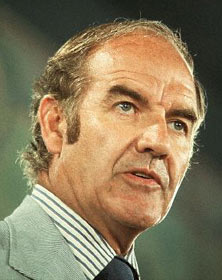George McGovern
|
|
Dr. George Stanley McGovern (born July 19, 1922 in Avon, South Dakota) was a United States Congressman, Senator, and Democratic presidential candidate, losing the 1972 presidential election to incumbent Richard Nixon.
McGovern was most noted for his opposition to the Vietnam War. He is currently serving as the United Nations global ambassador on hunger.
Biography
Born and raised in South Dakota, McGovern served as a B-24 Liberator pilot in World War II, and was awarded the Distinguished Flying Cross; his wartime exploits were later at the center of Stephen Ambrose's book The Wild Blue. On return from the war, he earned a PhD in history from Northwestern University and became a professor at his alma mater, Dakota Wesleyan University.
Although he was raised by two Republican parents, he chose not to join any particular party until the 1948 presidential election, when he registered as an Independent and joined the newly-formed Progressive Party. During the campaign, he attended the party's first national convention as a delegate and volunteered for the eventually unsuccessful campaign of its presidential nominee, former Vice President Henry A. Wallace. Four years later, in 1952, he heard a radio broadcast of Governor Adlai Stevenson's speech accepting the presidential nomination of the Democratic Party. He immediately went into town and registered as a Democrat, then volunteered for Stevenson's campaign the following day. Although Stevenson lost that election, McGovern remained active in Democratic politics. In 1956, he ran for and won a seat in the House of Representatives.
After two terms in the House, he unsuccessfully ran for the Senate in 1960, losing to Republican incumbent Karl Mundt 52-48%. The election loss made him available for appointment as the first director of President John F. Kennedy's Food for Peace program. In 1962, he stood for election to South Dakota's other Senate seat and won, serving his first of three Senate terms.
Although he voted in favor of the Gulf of Tonkin Resolution, McGovern later became a vocal critic of defense spending and an opponent of U.S. military involvement in Vietnam, often criticizing the policies of fellow Democrat President Lyndon Johnson. At the 1968 Democratic National Convention, McGovern stood as the flagbearer for some of the supporters of the late Senator Robert F. Kennedy, losing the Presidential nomination to Hubert H. Humphrey, and coming in behind Minnesota Senator Eugene J. McCarthy as well. However, he and his supporters were able to win procedural concessions that eventually facilitated his successful nomination at the 1972 Convention.
In the 1972 election, McGovern ran on a platform of ending the Vietnam War, instituting a guaranteed minimum income for all Americans, and ratifying the Equal Rights Amendment. His campaign manager was Gary Hart. Between difficulties with his running-mate, Thomas Eagleton (whom he eventually dropped and replaced with Sargent Shriver), and the Republicans' successful campaign to paint him as unacceptably radical, he suffered a 60% - 38% defeat to Richard Nixon — at the time the second biggest landslide in American history, losing in the Electoral College 520 to 17. McGovern failed to win his home state.
After this loss, McGovern returned to South Dakota, where he was re-elected to the Senate in 1974. In 1980, he was defeated for re-election by U.S. Rep. James Abdnor amidst that year's Republican sweep, which became known as the "Reagan Revolution." In 1984, he sought his party's presidential nomination once again. Although he finished in third place in the Iowa caucus amidst a crowded field, his campaign eventually floundered and he withdrew soon after the New Hampshire primary.
His importance in U.S. politics diminished over time, but his legacy endures as a symbol of the political left during the turbulent 1960s. From 1998 to 2001, he served as U.S. ambassador to the U.N. Food and Agriculture Agencies, based in Rome, Italy. (He was succeeded in this post by long-time Democratic Rep. Tony Hall.) In 2001, he was appointed U.N. Global Ambassador on World Hunger.
Personal tragedy struck McGovern in 1994, when his daughter Teresa died of exposure while intoxicated. McGovern revealed his daughter had battled her addiction for years. He founded a non-profit organization in her name to help others suffering from alcoholism.
He endorsed Democrat Wesley Clark's unsuccessful candidacy for the Democratic Party nomination for the 2004 presidential election on January 18, 2004 (24 days before Clark's withdrawal from the race). McGovern still lectures and owns a used book store in his summer home of Stevensville in Montana's Bitterroot Valley.
On June 2, 2005, McGovern stated "the US media needs a modern-day "Deep Throat" within the administration of President George W. Bush to reveal how America was 'misled' on Iraq."
External link
- Dakota Wesleyan University (http://www.dwu.edu/)
Further reading
- Hart, Gary, Right from the Start: A Chronicle of the McGovern Campaign, Quadrangle, 1973.
- Marano, Richard Michael, Vote Your Conscience: The Last Campaign of George McGovern, Praeger Publishers, 2003.
- McGovern, George S., The Essential America: Our Founders and the Liberal Tradition, Simon & Schuster, 2004.
- McGovern, George S., Grassroots: The Autobiography of George McGovern, Random House, 1977.
- McGovern, George S., Terry: My Daughter's Life-And-Death Struggle With Alcoholism, Plume Books, 1997.
- McGovern, George S., The Third Freedom: Ending Hunger in Our Time, Rowman & Littlefield Publishers, 2002.
- McGovern, George S., A Time of War! A Time of Peace, Vintage Books, 1968.
- Thompson, Hunter S., Fear and Loathing: On The Campaign Trail '72, Warner Books, 1973.
| Preceded by: Hubert H. Humphrey | Democratic Party Presidential candidate 1972 (lost) | Succeeded by: Jimmy Carter Template:End boxde:George McGovern fr:George McGovern nl:George McGovern pl:George McGovern |

